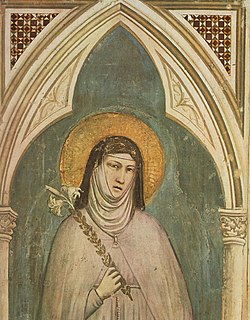 Giotto di Bondone's fresco of Saint Clare of Assisi | |
| Gender | Female |
|---|---|
| Origin | |
| Word/name | Latin |
| Meaning | clear, bright, famous |
| Other names | |
| Related names | Clare, Clair/Claire, Clarissa, Klara |
Clara or Klara is a female given name. It is the feminine form of the Late Latin name Clarus which meant "clear, bright, famous". Various early male Christian saints were named Clarus; the feminine form became popular after the 13th-century Saint Clare of Assisi (called Chiara in Italian), one of the followers of Saint Francis, who renounced her privileged background and founded the order of Poor Clares.
Contents
Clare was the main English form of the name used in the Middle Ages, but the Latin spelling Clara became more popular in the 19th century. [1]
Glara is a related Kurdish name with a common origin, meaning "vision or brightness". [2]